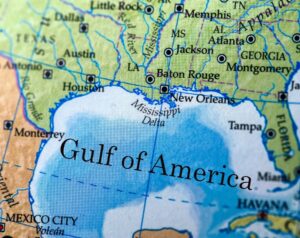Politics
Judge Issues Ruling In High-Profile Case Between Trump Admin, Associated Press

In a sharp rebuke to the Trump administration, a federal judge has sided with the Associated Press in a high-stakes First Amendment case, ordering the White House to stop excluding the AP from media events based on the news agency’s refusal to adopt the term “Gulf of America.”
U.S. District Judge Trevor McFadden issued the ruling Wednesday, granting a preliminary injunction that prohibits the White House from continuing to bar AP reporters and photographers from access to press events after the outlet declined to rename the Gulf of Mexico, as directed by President Trump earlier this year.
“No, the Court simply holds that under the First Amendment, if the Government opens its doors to some journalists… it cannot then shut those doors to other journalists because of their viewpoints,” McFadden wrote in his 41-page order. “The Constitution requires no less.”
The controversy began when the AP declined to update its Stylebook to reflect the White House’s new designation of the Gulf. In response, AP reporters were cut off from limited-access events, including Oval Office pool sprays, East Room briefings, and trips aboard Air Force One.
According to court testimony, the AP had been “systematically excluded” since February 14 despite holding hard press credentials. Testimony revealed that the White House press secretary, Karoline Leavitt, summoned AP’s Zeke Miller in February and told him the agency would be denied pool access unless it updated the Stylebook.

map showing the gulf of america
“She told [Miller] that, at President Trump’s direction, the AP would no longer be permitted in the Oval Office as part of the press pool until and unless the AP revised its Stylebook,” according to court documents.
The ruling said that while the government has wide discretion in who gets access to nonpublic spaces like the Oval Office, it may not use that discretion to penalize viewpoints it disfavors.
“The Government has been brazen about this,” McFadden stated. “Several high-ranking officials have repeatedly said that they are restricting the AP’s access precisely because of the organization’s viewpoint.”
Deputy Chief of Staff Taylor Budowich acknowledged on the record that AP’s exclusion stemmed from its refusal to use “Gulf of America.”

In one social media post, Budowich wrote, “The Associated Press continues to ignore the lawful geographic name change of the Gulf of America,” before stressing that the AP had no guaranteed right to access spaces like the Oval Office or Air Force One.
McFadden rejected that line of argument, noting that when the government opens access to certain media, it cannot selectively punish organizations for political or editorial decisions.
The judge also ruled that the AP had shown clear evidence of retaliation that harmed its business model. During testimony, AP staff described delays in publishing photos and stories compared to competitors who had access, leading to a loss of clients and even a $150,000 canceled advertising deal.
“The AP is getting absolutely slaughtered,” said AP photographer Evan Vucci, who described the agency’s access as being “basically dead in the water.” In issuing the injunction, McFadden wrote, “The AP has shown that it remains subject to viewpoint discriminatory exclusions from places that the Government has opened as nonpublic fora.”
The ruling does not compel the White House to grant the AP permanent or preferred access but requires it to treat the AP on equal footing with other credentialed media. “The Court merely declares that the AP’s exclusion has been contrary to the First Amendment,” McFadden concluded.

